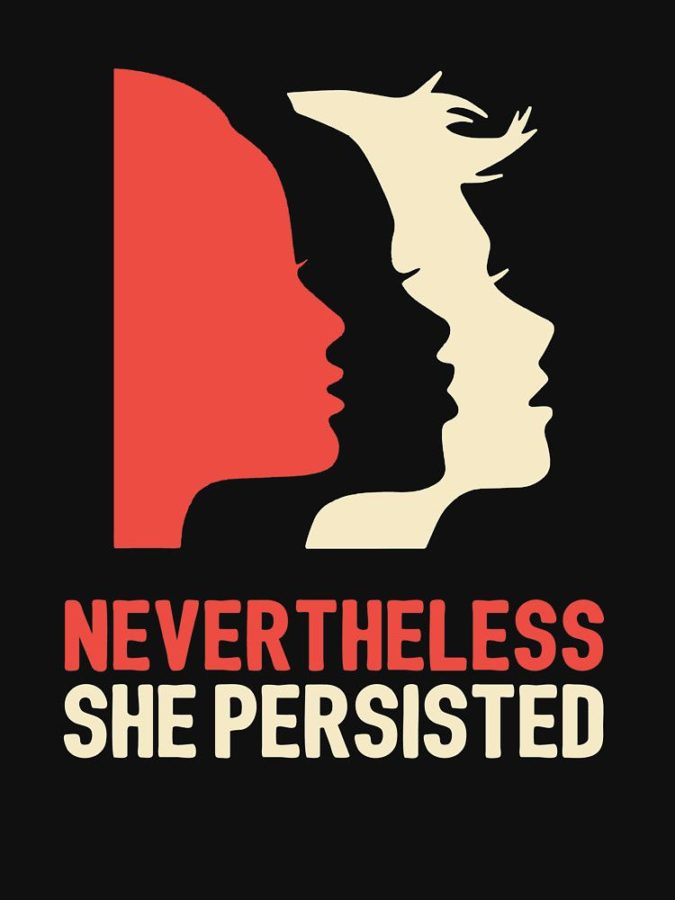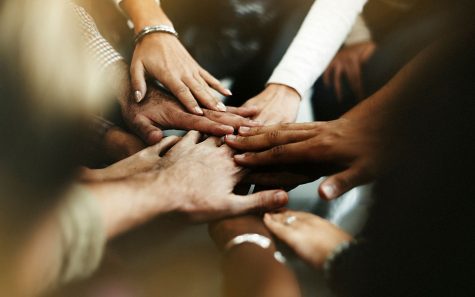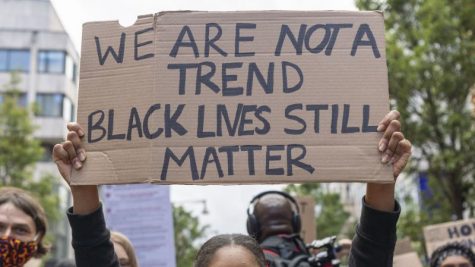Listen to Us: Why Women Need to be Heard
I have a naturally high-pitched, “girly” voice. In an academic environment, people––particularly men––tend to talk over me and brush off my opinions because I sound like a “little girl,” something that I realized, with time, was synonymous for being worthy of little respect. People pay more attention to what I sound like than to what I am trying to say. For a very long time, as a result of this treatment, I began to believe that my words were not worth listening to. I had internalized this to the extent that I began training my voice to sound differently. Over time, I adopted an altered a slightly deeper tone of voice. This did not entirely fix the problem, but it definitely helped. I had to change a part of myself in order to be valued as a person in this society.
Women often face many challenges in professional environments that are a product of the external expectations enforced upon them.
As a person moves higher up the ranks in specific fields, such as in education and business, the number of women employed generally decreases, according to Jocelyn Sage Mitchell, an assistant professor in residence in the liberal arts program at Northwestern University in Qatar who specializes in political science. When women are a minority in the workplace, a clear power imbalance exists between them and their male coworkers and authority figures, making it difficult for them to find their way in that professional environment among their male colleagues, she added.
In her book, “Lean In: Women, Work, and the Will to Lead,” Sheryl Sandberg, the current COO of Facebook, wrote about the challenges she faced that were specific to the kind of workplace Mitchell spoke of. An example Sandberg gave was of her fear over negotiating her initial salary when accepting her job at Facebook. She did not want to come off as too demanding despite the fact that negotiating at any place of employment is supposed to be a right, not an unreasonable demand, she wrote.
Sandberg cited a study published in 2003 that examined the starting salaries of students graduating with a master’s degree from Carnegie Mellon University. The study found that 57 percent of male students and only seven percent of female students had asked for a higher offer. This study was one of three used to research wage inequality between men and women, carried out by researchers Linda Babcock, Sara Laschever, Michele Gelfand and Deborah Small. The largest of the three studies, conducted as a survey online, showed that men place themselves in situations to negotiate through more often than women do, and that men are more likely to consider most of their interactions as potential negotiations. “People expect men to advocate on their own behalf, point out their contributions, and be recognized and rewarded for them,” wrote Sandberg. “For men, there is truly no harm in asking.”
Research also suggests that women apologize far more than men in daily situations because men have a higher threshold for what counts as offensive or worth an apology. In situations regarding emotional expressions, while men and women might feel the same amount of anger and may exhibit it in the same way, people tend to react more negatively to angry women than angry men. This causes women to tone down their expressions of emotion. Alyaa Al-Mazrouei, a journalism junior at NU-Q, said that she is wary of getting too excited or passionate when proposing an idea in professional environments because people view that with disdain. In her book “What Happened,” Hillary Clinton wrote that she had to employ a linguist to help change her voice during her presidential campaign in 2016, because people hated it so much. She also stated that she made sure to smile often and to react to all attacks with silence and patience, she could not afford to appear visibly upset or angry. Ironically, she had to use these strategies when running against roaring and raging Donald Trump.
There are countless examples of instances that point to the same conclusion: there is a great disparity between the way women and men behave and are treated in professional settings. Why this disparity exists has much to do with the gendered expectations that have become the norm within society.
“Girls are friendly,” said Pamela Krayenbuhl, an assistant professor in residence in the communication program at NU-Q. “Girls are open and kind and positive.” Krayenbuhl used these stereotypes as examples of the characteristics girls are commonly expected to have when they are growing up. Reflecting on her own upbringing, Krayenbuhl said these stereotypes are the reason why she puts on a light-hearted and positive exterior in public. She said she was “trained” to be this way because she is a woman. At the same time, Krayenbuhl said she is taken less seriously in professional and academic settings because of her energetic attitude. For example, when she was younger, her natural enthusiasm towards interdisciplinary studies was consistently interpreted as a “lack of focus and discipline,” especially by men. She added that in the same situation, however, boys her age with multiple passions for different fields of study were seen as “impressive.”
Rana Kazkaz, an assistant professor in residence of communication at NU-Q, owns a production company with her husband. Despite the hard work she puts into writing the films they co-direct, she said people often assume that her husband is the one who has written and directed them. As a result, film-related questions and congratulatory expressions are typically directed towards him rather than her. “It will be assumed that my role will somehow be minimal as compared to his,” said Kazkaz.
Women time and time again face the same hurdles when navigating through the professional world. Men have held positions of power for so long that women vying for the same role are received with skepticism.
A part of this is because of the gender stereotypes we are held down by: women nurture and men provide. This separate-sphere ideology that dominated during the eighteenth and nineteenth centuries is still subtly present today. As this concept suggests, men are most often associated with public spaces like the workplace. Women, therefore, tend to be immensely scrutinized when they enter this public sphere––one that they are not normally identified with. An experiment conducted by professors from Columbia University and New York University in 2003, revealed that the same highly accomplished person under a different name was seen as more appealing depending on the gender that name implied. The students that participated in this study said they would prefer to work with Howard (the male version) rather than Heidi (the female version) because he seemed like a better colleague. To them, Heidi seemed more self-centered than Howard.
Women with the same accomplishments as men are viewed differently simply because they have achieved something. Their only fault, in this case, is to have those accomplishments. By striving for traditionally ‘male’ goals, women behave in a way that society deems unnatural and are thus met with criticism.
Voicing an opinion, directing orders and competing with your colleagues are all seen as ‘male’ qualities. Krayenbuhl said that if she is slightly stern with her students, they begin to call her out for being rude or mean, whereas a male professor who does the same is listened to and respected. A study published in the academic journal PS: Political Science & Politics in 2018, found that female professors receive poorer student evaluations as compared to their male colleagues only because of their gender. “They will revere a man who is tough, but they will hate a woman who is [tough],” agreed Kazkaz. In other words, a professionally successful woman is usually a disliked woman.
This is also demonstrated in the kinds of jobs women hold. Statistics still show that very few women reach positions of prestige or power in the professional sphere. At Fortune 500 companies, just 6.4 percentof the CEOs are women. Only eight percentof the directors, four percent of the cinematographers, 16 percent of the writers and 26 percent of the producers working on the top 250 grossing films in Hollywood in 2018 were women. In India from 2015-2016, about 26 percent of professor and equivalent faculty positions were held by women. In Japan, 24 percent of full-time university teachers in 2016 were women.
“We’re inviting very specific ideas around acceptability to become the standard,” said Krayenbuhl. According to her, society has begun talking about ideas of inequality, leading to the belief that the world has developed to a point where it is easier for women to progress. But the numbers prove otherwise because in reality people’s actions do not reflect these “ideas around acceptability,” she added.
If we look at these examples closely, a disconcerting fact emerges. Not only is it difficult for a woman to act professionally in a position that requires them to do just that, but she is also reprimanded for acting traditionally feminine. As Sandberg explains in her book, women strive to be pleasant in order to be liked. However, these very qualities are also used as evidence against them in professional fields. My soft but high-pitched voice is too feminine to be listened to with respect. Krayenbuhl’s cheerful and forward-looking attitude is too feminine for her to be perceived as knowledgeable. There is a paradox that exists surrounding what women shoulddo in the workplace and what they are expectedto behave like. Traditionally feminine traits apparently undermine our competence, but traits that display our competence provoke gender-based backlash.
It is true that these issues vary from person to person and from place to place, over a range of ethnicities, religions and races. The Angry Black Woman trope, birthed in late 18thcentury America, for example, disproportionately hurts black women. This is made evident by the treatment of Michelle Obama during her husband’s presidential campaign and the reaction to Serena Williams’ outrage directed at a referee during the U.S. Open held last year.
Meanwhile in the Middle East, many women must contend with a “macho culture,” according to Sami Hermez, assistant professor in residence of anthropology at NU-Q. According to him, issues concerning gender segregation in public spaces and clothing requirements are also more prevalent in the Arab world as compared to other regions. Despite these differences, it is important to note that at their core, these issues stem from the same idea: women and men are held to a different standard, where women unfairly bear the burden of molding themselves to the oppressive expectations that come with those standards.
It is difficult to see how this problem can be solved. Outwardly, it may seem like the world is progressing towards equality between the sexes. In truth, the concept of equality is more talked about than acted upon. Women have now begun to find the courage to speak out about the oppression and discrimination they face. The rise of the Time’s Up and #MeToo movements, triggered by the revelation of the horrific experiences women in the film industry had with ex-film mogul Harvey Weinstein, shows how women are being encouraged to speak out about their struggles in environments where powerful men’s actions usually go unquestioned. This trend empowers women, who have been conditioned to believe that their words matter less than a man’s, to tell their stories. While these are positive developments, little has been done to create action in response to these stories.
Cases like those of Joe Biden, R. Kelly, Tucker Carlson, Bill Cosby and Brett Kavanaugh in the United States, Ali Zafar in Pakistan, and Alok Nath and Nana Patekar in India have taken many years to be reported on and many more to be addressed. Some of these men have not faced any charges of accountability. Even the men whose actions have been met with some repercussions are still supported by many people. Kelly’s fans continually offered to pay his bail. Fox News has refused to comment on Carlson’s history of misogynistic and racist comments, so he is allowed to carry on with the shows that he hosts. Alok Nath, accused of rape during India’s #MeToo movement last year, is starring as a judge in a film about sexual harassment. Actor and singer Ali Zafar was accused of harassment by numerous women in Pakistan early last year, and yet his film “Teefa in Trouble,” released shortly after these allegations, became one of the country’s highest grossing films. It is reactions like these that enable men like Biden, a potential 2020 U.S. presidential candidate who has been accused by eight women of inappropriate touching, to laughingly dismiss and joke about the allegations against him.
If women are to fulfill contradictory and unattainable expectations without a single cry for help, while suffering sexist criticism for the work they engage in, how are they supposed to function in a world where their voices are rarely heard?
Women’s struggles, in this way, are either demeaned, ignored or forgotten. In a society where women are constantly made to believe that they matter less, that even when they speak out and stand up for themselves it is unlikely that they will be supported, it is everyone’s responsibility to recognize what they endure. We cannot forget their stories. In order for us to truly progress, we need to listen, we need to protest, we need to act, we need to hold people (including ourselves) accountable and change our own behavior to show that we care.
A positive change will not magically appear unless we actively try to create it. This is why we need to believe the stories we are told. For women everywhere, we must try.

















